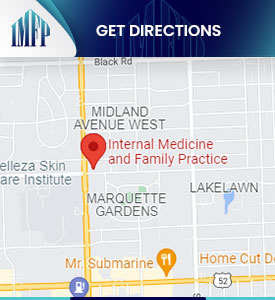Dehydration Treatment Specialist in Joliet, IL
Dehydration is extremely common and can happen quickly and unexpectedly. A study suggests that even if human body loses 1.5% of its water, it starts showing symptoms ranging from mild to severe. Severe dehydration causes different health issues such as dizziness, headache, tiredness, dry mouth, lips and eyes, peeing less often than usual and tiredness. If you are experiencing the symptoms of dehydration, contact Dr. Wael Mctabi, MD for right treatment at Internal Medicine and Family Practice. For more information, contact us or schedule an appointment online! We are conveniently located at 1719 Glenwood Ave Joliet, IL 60435. We welcome walk-ins!




Table of Contents:
What is dehydration?
How does dehydration develop?
What are the signs of severe dehydration?
When should you go to a doctor for dehydration?
Dehydration signs and symptoms may show differently for everyone; however, you will not know you are in need of fluids to help the body until you become dehydrated. If you are experiencing any signs or symptoms of dehydration, visit our walk-in clinic today for treatment!
Dehydration can occur when an individual begins to lose or use more fluids in their body than they are able to consume, and the body then does not have enough water or other fluids in it to continue carrying out normal bodily functions. If the individual cannot replace the lost fluids quickly enough, the body can become severely dehydrated.
Many become dehydrated throughout the day, especially children and seniors which can be especially dangerous for them. One of the most common causes of dehydration in babies or children and seniors is severe diarrhea and vomiting. Seniors however also have a naturally lower volume of water in their bodies, mixed with any other pre-existing conditions or if they are taking any medications, it can increase their risk of dehydration.
Dehydration is considered a minor illness, such as infections that can affect the lungs or bladder and result in dehydration for seniors.
Dehydration may also occur in anyone that is enjoying the warmer temperatures, strenuous activities, or exercise if they are not upping their water intake during these times.
Dehydration develops when the individual’s body starts to lose more fluids than one is able to drink or intake. Some of the more common causes of dehydration are:
• Excessively sweating
• Vomiting
• Diarrhea
If your body is not able to maintain the fluids it needs to properly function, the body will begin to go into shock from dehydration. The shock experienced can lead to other parts of the body becoming negatively affected and can hurt the organs, cells, and tissues, which will all start to fail to function and can lead to even more dangerous complications of dehydration if not medically treated quickly.
Dehydration can be felt in mild to severe symptoms. Individuals who may experience mild dehydration can treat their dehydration at home usually; however, anything moderate to more severe in nature will need immediate medical care from either primary care services or your local emergency room for treatment.
Many of the common signs and symptoms of dehydration one can experience may differ from each individual to another and may not be a reliable indicator of early-onset dehydration. Many experience dehydration and in particular seniors who do not feel thirsty or feel the need to drink water until they are already dehydrated. It is important to remember to increase your water intake continuously throughout the day and even more so during the warmer temperatures as well as when you are feeling ill.
Several common signs and symptoms noted that individuals may experience with severe dehydration can include:
Infant or young child
• Dry mouth and tongue
• No tears when crying
• No wet diapers for three hours
• Sunken eyes and cheeks
• Sunken soft spot on top of the skull
• Listlessness or irritability
Adult
• Extreme thirst
• Less frequent need to urinate
• Dark-colored urine
• Tired
• Dizzy
• Confused
When your body is unable to sufficiently keep a regular number of fluids in the body to function properly, dehydration will occur quickly, and the body will then go into a state of shock and begin showing signs and symptoms of dehydration. Dehydration occurs more regularly during the warmer months, and the body will start to produce more sweat than usual to help cool down the individual. If you are feeling ill as well, you may see more common symptoms of vomiting or diarrhea, which can lead to dehydration.
Mild to moderate dehydration should still be taken seriously; however, severe dehydration can be extremely dangerous and will need immediate medical attention from primary care physicians like the staff at Internal Medicine and Family Practice for treatment. A few signs and symptoms you can be on the lookout for when it comes to mild or moderate dehydration are
• Feeling thirsty
• Dry and sticky mouth
• Dry skin
• Infrequent urination
• Dark yellow urine
• Headaches
• Muscle cramping
Severe dehydration will also include these symptoms as well as:
• No urination or extremely dark yellow pee
• Dry skin
• Dizziness
• Rapid beating heart or breathing
• Sunken eyes
• Feeling lethargic
• Tired confused or irritable
• Fainting
If you are suffering from symptoms of mild to moderate dehydration, visit Internal Medicine and Family Practice at 1719 Glenwood Ave Joliet, IL 60435. Call us or book an appointment today. We serve patients from Joliet IL, Plainfield IL, Lockport IL, Channahon IL, Romeoville IL, Manhattan IL and surrounding areas
At Internal Medicine and Family Practice, we provide effective and personalized dehydration treatment to help patients recover quickly and safely. Our experienced medical team, led by Dr. Samiullah Choudry, offers customized care based on the cause and severity of dehydration, whether from illness, heat exposure, or physical activity. Using IV hydration and electrolyte replacement, we restore balance to your body while monitoring vital signs to ensure complete recovery. Our clinic focuses on patient comfort, offering prompt evaluation and compassionate treatment in a supportive environment. Whether you’re experiencing mild or severe dehydration, Internal Medicine and Family Practice delivers expert care to rehydrate your body and restore your strength.
Check Out Our 5 Star Reviews








